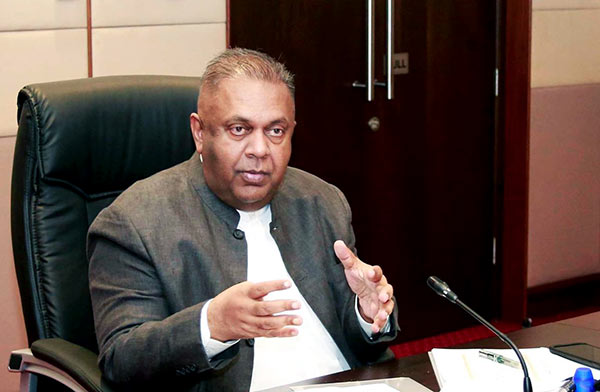All Government borrowings used to re-pay debt – Mangala

“Since 2016, all government borrowings have been used to settling debt. Not for any other expenditure,” Finance Minister Mangala Samaraweera has disclosed.
In a media release yesterday, Minister Samaraweera pointed out that when former President Mahinda Rajapaksa assumed office in 2005, government debt per citizen was Rs.113,131, but when he left it was Rs. 355,708.“The real picture is even worse. Until 2007, virtually all of Sri Lanka’s foreign debt was on concessional terms. But from 2007 onwards, Sri Lanka started to commit the ‘original sin’ of borrowing in foreign currency loans on expensive commercial terms,” he added.
“The Rajapaksas left Sri Lanka in a debt trap.
The Rajapaksas borrowed more foreign debt – at higher interest rates-than any previous government. That would not have been such a complete disaster if the debt was invested in high-return projects. Instead these expensive funds were spent on White Elephant construction and consumer imports,” the Minister said in the statement.
“In 2013, the Rajapaksa government directed the National Savings Bank to obtain $750 million from international markets at the highest ever interest rate of 8.9 percent. This is at a time when the global benchmark rate for that type of loan was 1.3 percent. The Chairman of NSB at the time, a respected civil servant, was removed and replaced with a batchmate of the then Treasury Secretary on the instruction of the then Finance Minister, Mahinda Rajapaksa.
“The irresponsibility and mismanagement does not end there. While the government went on a borrowing spree on international capital markets, government revenue plummeted. In 2005 Sri Lanka’s tax-to-GDP ratio was 13.7 percent. By 2014, it was 10.1 percent, one of the lowest in the world. As a result, expenditure necessary for long-run growth such as health and education suffered. And Sri Lanka needed to borrow more just to repay the Rajapaksa loans. The whole country should know that since 2016, all the money we have borrowed has been to pay back old loans,” he highlighted.
“Despite this legacy, we have stabilized the economy. Last year, Sri Lanka had its first non-trivial primary surplus in 63 years. This means that, leaving aside interest payments, Sri Lanka’s revenue was greater than its expenditure for the first time in over six decades. No other government has succeeded in achieving this target. This also means that, since 2016, all government borrowings have been used to settle debt. Not for any other expenditure.
“Despite the coup and the Easter bombing the economy has held-up. We have put some key fundamentals in place. Government revenue, measured as a percentage of GDP, is up by 16 percent from end-2014. Exports, again as a share of GDP, rose from 21 percent in 2014 to 23 percent today.Capital expenditure on health doubled and no government increased education spending as quickly and as substantially as we have.
“There have been countless infrastructure projects: the Moragahakanda and Kalu Ganga Dams and irrigation schemes, and Uma Oya multi-purpose development project. Under the Gampereliya scheme, more than 105,000 projects were implemented across 160 electorates. To date, nearly 40,000 roads and bridges have been built to facilitate rural and urban transportation. Nearly 1500 projects have been implemented across the island to renovate or construct sanitary facilities in schools. Enterprise Sri Lanka has disbursed nearly Rs. 65B in the form of concessional loans to entrepreneurs in the country, with capital flowing into sectors including agriculture, services, and manufacturing for the domestic and export markets. The LRT and Colombo Elevated Highway will go a long way to solving traffic problems in the city.
“As you all know, government salaries have more than doubled, in addition to the 2500 rupee allowance. From 1st January, the Presidential Commission Report on salary anomalies will be implemented. And perhaps the greatest benefit of all is the control of inflation – the cost of many essential goods including food items and fuel have fallen,” Minister Samaraweera concluded.
(Source: Daily News)

Latest Headlines in Sri Lanka
- Batalanda commission report tabled in Sri Lankan Parliament March 14, 2025
- Female Grama Niladharis withdraw from night duty over security concerns March 14, 2025
- Sri Lanka ranked as the best country for settling down March 14, 2025
- UN pledges support for Sri Lanka’s industrial and SME development March 13, 2025
- Former Boossa Prison Superintendent shot dead in Akmeemana March 13, 2025



Hon Ravi K was an efficient Finance Minister; the King, due to his personal prejudices, made sure Ravi K was kicked out.
The Public Sector is overloaded and totally unproductive. But the UNP recruits their supporters.
The next President should cut numbers in Public Service by > 50%.
Mangala, your favourite Modada*a cannot do this. He does not have any intellect for leadership and decision making.
Maybe GR can.
If loans were taken to settle loans there cannot be an increase in the total loan amount, but total loan amount has gone up from 6.5 Billion to 12 Billion.